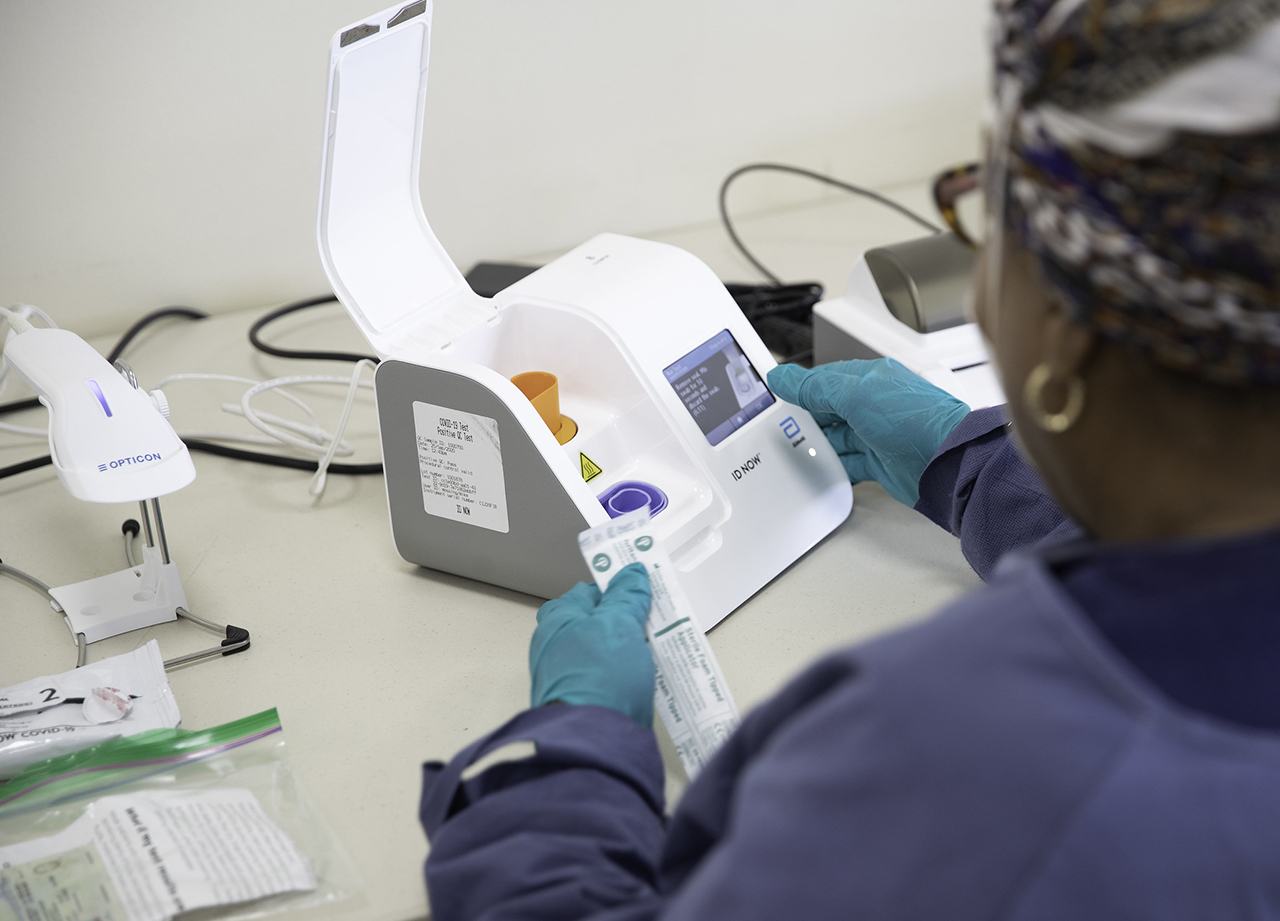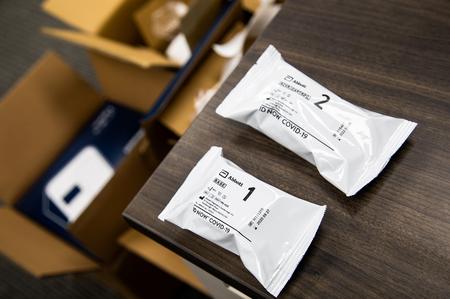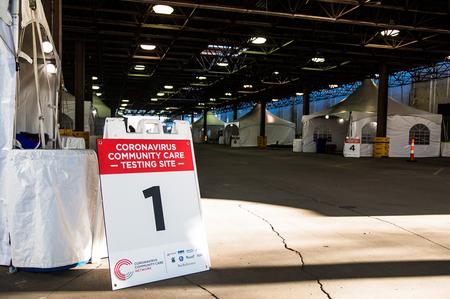Omicron Prompts a New Wave of COVID-19 Testing in Detroit
As the new year begins, Michigan is seeing a new surge of coronavirus cases amid the rise of a contagious new variant and the growing possibility of breakthrough infections.

As the new year begins, Michigan, like many states around the country, is seeing a new surge of coronavirus cases. The rise of the omicron variant during the holiday season and the growing possibility of breakthrough infections are prompting many to get tested for COVID-19.
In the final days of 2021, the state saw a new record for daily coronavirus cases. The Michigan Department of Health and Human Services reported more than 61,000 cases since Christmas. Hospitalizations are also up, primarily among the unvaccinated. That trend has continued into the new year, driving an influx of people seeking COVID-19 testing after the holidays.
“When we think it’s going down and you can focus on vaccination and not testing, it’s changed. So we’re constantly in a state of reacting.” –Hakim Berry, City of Detroit
“The data is clear; vaccines and the booster are our best defense against COVID-19. From Jan. 3 to Dec. 15, 2021, people who were unvaccinated or not fully vaccinated represented: 85.1% of COVID-19 cases, 88.1% of hospitalizations, 85.5% of deaths,” MDHHS Chief Medical Executive Dr. Natasha Bagdasarian wrote on Twitter.
Nearly 4,000 residents are hospitalized with COVID-19 statewide, while more than 27,000 people have died from the disease throughout the pandemic.
Concerns over possible infections are stressing testing centers in Detroit, where most residents are not vaccinated.
“Every time we think we got it solved, this pandemic has changed,” says Detroit’s Chief Operating Officer Hakim Berry. He leads the city’s pandemic response program and oversees more than 8,000 public employees.
“When we think it’s going down and you can focus on vaccination and not testing, it’s changed. So we’re constantly in a state of reacting.”

Detroit health officials are providing free tests for residents and city workers at the Joseph Walker Williams Community Center on Rosa Parks Boulevard. Vaccines are free at many sites, and the city’s health department is making at-home vaccinations possible for those that request them. But Berry says omicron is putting pressure on those sites.
“Prior to the surge, we probably tested 100 to 200 [people daily.] Now the demand is up to over 1,000 a day,” Berry says.
According to state data, Detroit has administered more than 1.4 million laboratory tests throughout the pandemic. The daily rate increased significantly last fall leading up to the holiday season. The first case of omicron in Michigan was detected on Dec. 9.
To prevent a possible testing shortage during the omicron surge, Berry says Detroit received about 30,000 antigen tests from the state health department that can be used at-home. That would supplement the 3,000 rapid molecular tests Detroit receives weekly from Abbott Laboratories, which the city orders at $37 per unit. The company is the largest recipient of the city’s pandemic-related spending at over $12 million. Testing support and services are Detroit’s top COVID-19 activity at nearly $35 million, which is paid out through various federal funding programs.
Berry says now, the city may need to order more tests to keep up with the demand.
“Just when we think we got it solved, we’re back at the front line again.”
Listen: Hakim Berry discusses the city’s approach to the pandemic as it enters a third year.
WDET’s Eli Newman spoke with Hakim Berry to talk about the increased demand for testing in Detroit. Read excerpts, edited for clarity, below:
Newman: Can you speak to the demand in recent weeks or at least during like the holiday season as we’re entering into 2022?
Berry: Prior to the surge, there were days where we were probably testing 150 to 200 [people.] Now that demand is up to over 1,000 a day. That’s handling the scheduled plus the walk-ons. So we’re back at those high numbers again.
That’s a pretty concerning figure to hear. So do you feel that the city has the capacity to handle all of that?

We’ve never lost our ability to test. If you recall back when we set up the State Fairgrounds, we were doing well over 1,000 a day. And we’ve maintained the bones of that structure no matter where we moved it, so it’s just a matter of flipping the switch to adjust to the pending volume.
We’re entering our third year of the pandemic right now. Has the city had to reconfigure how it’s approached everything, especially with stagnating vaccination rates?
Every time we think we got it solved, this pandemic has changed. When we think it’s going down and you can focus on vaccination and not testing, it’s changed. We’re constantly in a state of reacting. Remember, we thought two shots was it. And now you need a booster. And you need another booster in six months as these different variations of the original virus come on and overtakes the world. We’re constantly in a learning phase.
Do you feel that this city is prepared for a potential fourth booster shot? Is that something that your office is considering?
We’re prepared and we’re waiting to hear. We have the operation set up now to handle vaccinations. We’re looking at how to basically make this a standard part of the health department’s immunization program.
Can you reiterate what the policy is in terms of city employees? I know that many of the elected officials that are subject to the Open Meetings Act are now returning back into the office for the first time in two years basically, and the other employees are returning on staff. What is the city’s policy towards like testing, masking and vaccinating?
We actually wrote the manual on safe return to work. Back from June of 2020, our employees have been back to work and many of them could not work from home because we have to provide services to the city. Since the vaccinations were created and implemented, if you are vaccinated — or let’s start with not vaccinated — we have a testing cadence biweekly. We require any nonvaccinated employee to wear a mask at all times. We’ve limited the amount of occupants into a meeting room. We went through all of our work areas and ensure that they have plexiglass or sneeze guard so to speak. We made sure that proper social distances are there from one worker to the other, so we made sure that all of the cubicles and chairs are at least six feet apart. We’ve maintained that standard throughout the entire pandemic. There’s nothing more to change from us.
In fact, we have decided as we start back up, as many of their employers including school district looking, we’re going back to 100% mask requirement when we’re at work. We’re trying to reduce the amount of employees that are in vehicles, in our crews, and use multiple vehicles so that the congregating of employees is limited. We’re pushing back most meetings to be on Zoom and not in-person so then until we get through this surge, we want to make sure that we’re protecting employees.
Trusted, accurate, up-to-date.
WDET strives to make our journalism accessible to everyone. As a public media institution, we maintain our journalistic integrity through independent support from readers like you. If you value WDET as your source of news, music and conversation, please make a gift today.
